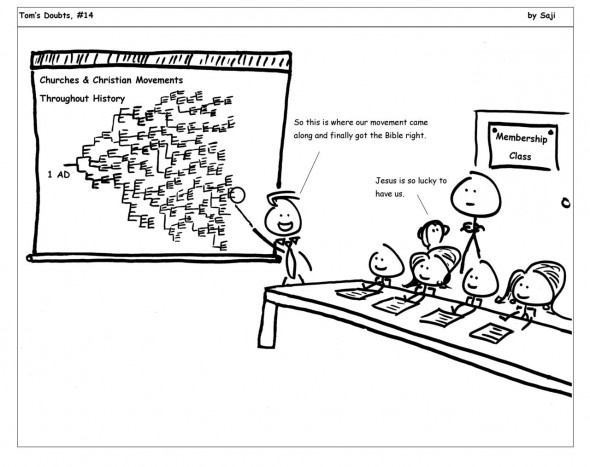In another thread (Ken Ham accepting ECs as Christians), @Randy posted the cartoon (re-pasted below here) which I thought was clever, funny, and with a good measure of self-focused humor at all our denominationalizing. But it provoked me to think on this a bit further - which I will share below.

Here is my reflection: what if we treated the general practice of science like religion is here treated? I.e. science, too, has many branches and specialties of study that could be shown in hierarchical form … off the main limb of physics come big branches like particle physics, thermodynamics, optics, astronomy, etc. And off of astronomy come finer “twigs” like cosmology, astrophysics, or other myriads of more specialized stellar or planetary studies. And those specialties will be recent outgrowths from the main historical trunks which at one time would have included much (like astrology) that has died away. How silly would it be today for a chemists to think, “our field finally got it right, and physics and all those others are just out to lunch.” Immediately we face an obvious objection: but this isn’t the same at all. Chemists study quite complementary things and the physicists, far from being in competition with all these others even freely use physics and other sciences to enhance and even illuminate their own field, and so it is with the whole gloriously populated field of scientific specialties. Furthermore, all these fields thrive on being pushed and challenged so as to cull away less productive inquiry and cultivate growth of knowledge.
In contrast, all these denominations / religions presumably do have a same focus (i.e. God and/or ultimate truth) and therefore are in competition with each other about who is right, and they ostensibly (on the anti-religionist’s view) only thrive by stifling any challenge or question to their authority.
Or so thinks the critic, along all these well-rehearsed and deepening ruts. Climbing up the steep edges of this rut to take a look at the broad landscape beyond might open up a new vista for consideration. Denominations too are outgrowths from previous bodies with a hope of improving on something or leaving behind some perceived liability. Nobody – scientist or religionist – ever moves from more desirable to less desirable territory. We always move toward perceived gain in understanding, goodness, or truth. We may be wrong to do so, but we never think so at the time. And just as the scientist appreciates what other specialties have to offer to help her in her own, so the perceptive religionist keeps her eyes open to what others outside her own group have to offer. In the healthy mind there is little room for the dogma that only one group has some entire monopoly on all truth, leaving all the others entirely in error about everything. In fact, the Christian even has a metaphor ready-made to help us see beyond our own self-importance, even at denominational levels: it’s called the body of Christ. Fingers and toes shouldn’t get uppity with eyeballs and ears or vice versa. Yes, competition and conflict still exist along with mutually exclusive claims, but just as all the fields of science ultimately work together despite their territorial spats and turf wars, so the world of denominations and religions also have their niches. And when bad parts get challenged and culled away, they too improve just as science and any other field also would improve through such struggle.